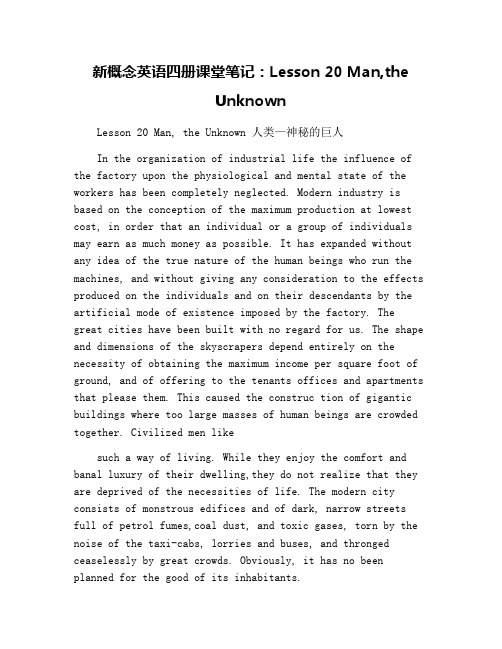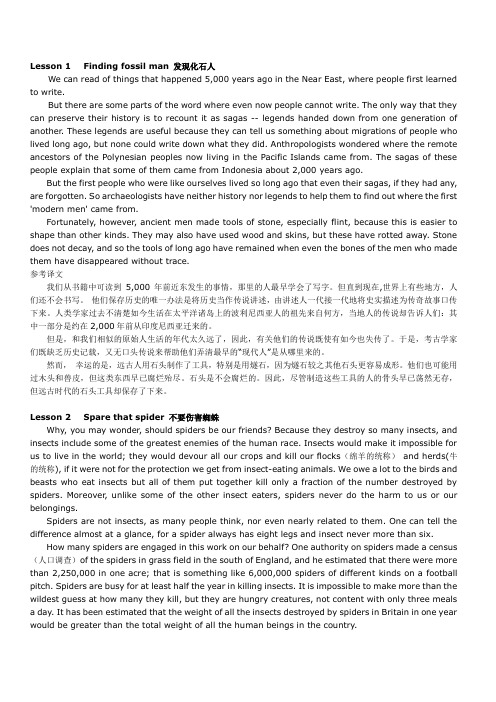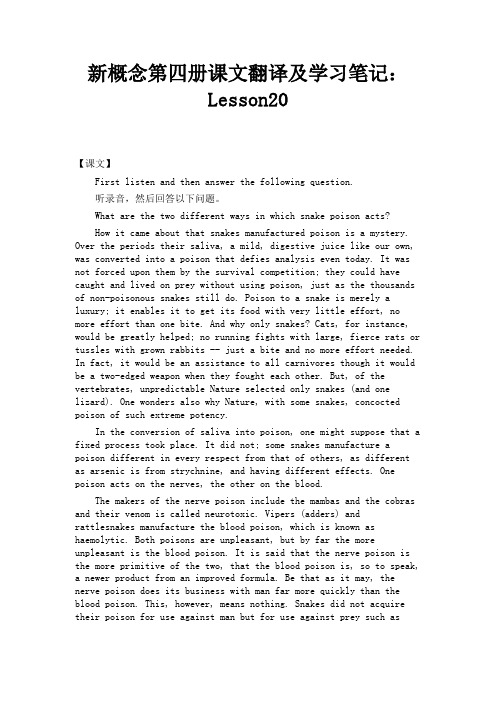新概念英语第四册课文翻译及学习笔记:Lesson20
- 格式:pdf
- 大小:10.47 KB
- 文档页数:6

Finding fossil man 发现化⽯石⼈人 Why are legends handed down by storytellers useful? We can read of things that happened 5,000 years ago in the Near East, where people first learned to write. But there are some parts of the world where even now people cannot write. The only way that they can preserve their history is to recount it as sagas -- legends handed down from one generation of storytellers to another. These legends are useful because they can tell us something about migrations of people who lived long ago, but none could write down what they did. Anthropologists wondered where the remote ancestors of the Polynesian peoples now living in the Pacific Islands came from. The sagas of these people explain that some of them came from Indonesia about 2,000 years ago. But the first people who were like ourselves lived so long ago that even their sagas, if they had any, are forgotten. So archaeologists have neither history nor legends to help them to find out where the first 'modern men' came from. Fortunately, however, ancient men made tools of stone, especiallyflint, because this is easier to shapethan other kinds.They may also have used wood and skins, but these have rottedaway. Stone does not decay, and so thetools of long ago have remained when even the bones of the men who made them have disappearedwithout trace. 读到flint 打⽕火⽯石anthropomorphic ⼈人格化拟1anthropo ⼈人类的让步⼀一⼀一trace backdate back read of read abouta trace of ⼀一些resound u叙述 Polynesian adj.波利利尼⻄西亚(中太平洋之⼀一群岛)的 Indonesia n. 印度尼⻄西亚 我们从书籍中可读到5,000 年年前近东发⽣生的事情,那⾥里里的⼈人最早学会了了写字。

$课文1 发现化石人1. We can read of things that happened 5,000 years ago in the Near East, where people first learned to write。
我们从书籍中可读到5,000 年前近东发生的事情,那里的人最早学会了写字。
2。
But there are some parts of the world where even now people cannot write。
但直到现在,世界上有些地方,人们还不会书写。
3. The only way that they can preserve their history is to recount it as sagas —- legends handed down from one generation of story tales to another。
他们保存历史的唯一办法是将历史当作传说讲述,由讲述人一代接一代地将史实描述为传奇故事口传下来.4。
These legends are useful because they can tell us something about migrations of people who lived long ago,这些传说是有用的,因为他们告诉我们很久以前生活在这里的移民的一些事情.5. but none could write down what they did。
但是没有人能写下来。
6. Anthropologists wondered where the remote ancestors of the Polynesian peoples now living in the Pacific Islands came from。
人类学家过去不清楚如今生活在太平洋诸岛上的波利尼西亚人的祖先来自何方,7. The sagas of these people explain that some of them came from Indonesia about 2,000 years ago。

新概念英语四册课堂笔记:Lesson 20 Man,theUnknownLesson 20 Man, the Unknown 人类—神秘的巨人In the organization of industrial life the influence of the factory upon the physiological and mental state of the workers has been completely neglected. Modern industry is based on the conception of the maximum production at lowest cost, in order that an individual or a group of individuals may earn as much money as possible. It has expanded without any idea of the true nature of the human beings who run the machines, and without giving any consideration to the effects produced on the individuals and on their descendants by the artificial mode of existence imposed by the factory. The great cities have been built with no regard for us. The shape and dimensions of the skyscrapers depend entirely on the necessity of obtaining the maximum income per square foot of ground, and of offering to the tenants offices and apartments that please them. This caused the construc tion of gigantic buildings where too large masses of human beings are crowded together. Civilized men likesuch a way of living. While they enjoy the comfort and banal luxury of their dwelling,they do not realize that they are deprived of the necessities of life. The modern city consists of monstrous edifices and of dark, narrow streets full of petrol fumes,coal dust, and toxic gases, torn by the noise of the taxi-cabs, lorries and buses, and thronged ceaselessly by great crowds. Obviously, it has no been planned for the good of its inhabitants.New words and expressions 生词短语physiological a. 生理的neglect vt. 忽视consideration n. 考虑descendent n. 子孙,后代existence n. 生存with no regard for 不关心skyscraper n. 摩天大楼gigantic a. 巨大的luxury n. 豪华monstrous a. 畸形的petrol fumes 汽油味edifice n. 大厦ceaselessly ad. 不停地mental a. 精神的expand vi. 扩张effect n. 影响mode n. 方式impose vt. 强加deprive vt. 剥夺tenant n. 租户civilize vi. 使文明dwelling n. 住所edifice n. 大厦monstrous a. 畸形的petrol fumes 汽油味1.physiological a. 生理的physics/physical+ biology/biological motel 汽车旅馆 motor+ hotelsmog 烟雾 smoke+ fogbiochemisty 生化 biology+ chemistr anthrax 炭疽热2.mental a. 精神的mental work 脑力劳动mental worker 脑力劳动者physical/manual work 体力劳动mental ground 思想境界mental outlook 精神面貌mental/natural age 心理/真实年龄mental patient 精神病人mental hospital 精神病院mentality n. 智力。

Lesson 1 Finding fossil man 发现化石人We can read of things that happened 5,000 years ago in the Near East, where people first learned to write.But there are some parts of the word where even now people cannot write. The only way that they can preserve their history is to recount it as sagas -- legends handed down from one generation of another. These legends are useful because they can tell us something about migrations of people who lived long ago, but none could write down what they did. Anthropologists wondered where the remote ancestors of the Polynesian peoples now living in the Pacific Islands came from. The sagas of these people explain that some of them came from Indonesia about 2,000 years ago.But the first people who were like ourselves lived so long ago that even their sagas, if they had any, are forgotten. So archaeologists have neither history nor legends to help them to find out where the first 'modern men' came from.Fortunately, however, ancient men made tools of stone, especially flint, because this is easier to shape than other kinds. They may also have used wood and skins, but these have rotted away. Stone does not decay, and so the tools of long ago have remained when even the bones of the men who made them have disappeared without trace.参考译文我们从书籍中可读到5,000 年前近东发生的事情,那里的人最早学会了写字。


新概念第四册课文翻译及学习笔记:Lesson20【课文】First listen and then answer the following question.听录音,然后回答以下问题。
What are the two different ways in which snake poison acts?How it came about that snakes manufactured poison is a mystery. Over the periods their saliva, a mild, digestive juice like our own, was converted into a poison that defies analysis even today. It was not forced upon them by the survival competition; they could have caught and lived on prey without using poison, just as the thousands of non-poisonous snakes still do. Poison to a snake is merely a luxury; it enables it to get its food with very little effort, no more effort than one bite. And why only snakes? Cats, for instance, would be greatly helped; no running fights with large, fierce rats or tussles with grown rabbits -- just a bite and no more effort needed. In fact, it would be an assistance to all carnivores though it would be a two-edged weapon when they fought each other. But, of the vertebrates, unpredictable Nature selected only snakes (and one lizard). One wonders also why Nature, with some snakes, concocted poison of such extreme potency.In the conversion of saliva into poison, one might suppose that a fixed process took place. It did not; some snakes manufacture a poison different in every respect from that of others, as different as arsenic is from strychnine, and having different effects. One poison acts on the nerves, the other on the blood.The makers of the nerve poison include the mambas and the cobras and their venom is called neurotoxic. Vipers (adders) and rattlesnakes manufacture the blood poison, which is known as haemolytic. Both poisons are unpleasant, but by far the more unpleasant is the blood poison. It is said that the nerve poison is the more primitive of the two, that the blood poison is, so to speak, a newer product from an improved formula. Be that as it may, the nerve poison does its business with man far more quickly than the blood poison. This, however, means nothing. Snakes did not acquire their poison for use against man but for use against prey such asrats and mice, and the effects on these of viperine poison is almost immediate.JOHN CROMPTON The snake【New words and expressions 生词和短语】saliva n. 唾液digestive adj. 助消化的defy v. 使不可能analysis n. 分析prey n. 被捕食的动物fierce adj. 凶猛的tussle n. 扭打carnivore n. 食肉动物vertebrate n. 脊椎动物lizard n. 蜥蜴concoct v. 调制potency n. 效力conversion n. 转变arsenic n. 砒霜strychnine n. 马钱子碱mamba n. 树眼镜蛇cobra n. 眼镜蛇venom n. 毒液neurotoxic adj. 毒害神经的viper n. 蝰蛇adder n. 蝮蛇rattlesnake n. 响尾蛇haemolytic adj. 溶血性的viperine adj. 毒蛇【课文注释】1.How it came about that snakes...a mystery.这句话的主语是一个句子:How it came about that snakes manufactured poison,谓语部分是is a mystery。
Lesson 20 Snake poison 蛇毒How it came about 主语that snakes manufactured poison is a mystery. Over the periods their saliva, 同位语a mild, digestive juice like our own, was converted into a poison 定语that defies analysis even today. It was not forced upon them by the survival competition; they 虚拟语气could have caught and lived on prey without using poison, just as the thousands of non-poisonous snakes still do. Poison to a snake is merely a luxury; it enables it to get its food with very little effort, 同位语no more effort than one bite. And why only snakes? Cats, for instance, would be greatly helped; no running fights with large, fierce rats or tussles with grown rabbits -- just a bite and no more effort needed. In fact, it would be an assistance to all carnivores 状语though it would be a two-edged weapon when they fought each other. But, 状语of the vertebrates, unpredictable Nature selected only snakes (and one lizard). One wonders also why Nature, with some snakes 状语concocted poison 定语of such extreme potency.In the conversion of saliva into poison, one might suppose that a fixed process took place. It did not; some snakes manufacture a poison 定语different in every respect from that of others, as different as arsenic is from strychnine, and having different effects. One poison acts on the nerves, the other on the blood.The makers of the nerve poison include the mambas and the cobras and their venom is called neurotoxic. Vipers (adders) and rattlesnakes manufacture the blood poison, 定语which is known as haemolytic. Both poisons are unpleasant, but by far the more unpleasant is the blood poison. It is said 主语that the nerve poison is the more primitive of the two, 主语that the blood poison is, so to speak, a newer product from an improved formula. 倒装Be that as it may, the nerve poison does its business with man far more quickly than the blood poison. This, however, means nothing. Snakes did not acquire their poison for use against man but for use against prey 定语such as rats and mice, and the effects 定语on these of viperine poison is almostimmediate.。
Royal espionage 王室谍报活动 Alfred the Great acted his own spy, visiting Danish camps disguised as a minstrel. In those days wandering minstrels were welcome everywhere. They were not fighting men, and their harp was their passport. Alfred had learned many of their ballads in his youth, and could vary his programme with acrobatic tricks and simple conjuring. While Alfred's little army slowly began to gather at Athelney, the king himself set out to penetrate the camp of Guthrum, the commander of the Danish invaders. There had settled down for the winter at Chippenham: thither Alfred went.He noticed at once that discipline was slack: the Danes had the self-confidence of conquerors, and their security precautions were casual. They lived well, on the proceeds of raids on neighboring regions.There they collected women as well as food and drink, and a life of ease had made them soft. Alfred stayed in the camp a week before he returned to Athelney. The force there assembled was trivial compared with the Danish horde. But Alfred had deduced that the Danes were no longer fit forprolonged battle: and that their commissariat had no organization, but depended on irregular raids. So, faced with the Danish advance, Alfred did not risk open battle but harried the enemy.He was constantly on the move, drawing the Danes after him. His patrols halted the raiding parties: hunger assailed the Danish army. ⼀一间谍活动中世纪的咏游歌⼿手⾦金金琴⺠民歌___魔术杂技的⾯面⼊入向那⾥里里-n 得-i 持久的微不不⾜足道需供⽽而应⾯面对尤击⼀一n⼩小规模战⽃斗Now Alfred began a long series of skirmishes -- and within a month the Danes had surrendered. The episode could reasonably serve as a unique epic of royal espionage! 阿尔弗雷雷德⼤大帝曾亲⾃自充当间谍。
Lesson 1 Finding fossil man发现化石人We can read of things that happened 5,000 years ago in the Near East, where people first learned to write.But there are some parts of the world where even now people cannot write. The only way that they can preserve their history is to recount it as sagas----legends handed down from one generation of storytellers to another. These legends are useful because they can tell us something about migrations of people who lived long ago, but none could write down what they did. Anthropologists wondered where the remote ancestors of the Polynesian peoples now living in the Pacific Islands came from. The sagas of these people explain that some of them came from Indonesia about 2,000 years ago.But the first people who were like ourselves lived so long ago that even their sagas, if they had any, are forgotten. So archaeologists have neither history nor legends to help them to find out where the first‘modern men’came from. Fortunately, however, ancient men made tools of stone, especially flint, because this is easier to shape than other kinds. They may also have used wood and skins, but these have rotted away. Stone does not decay, and so the tools of long ago have remained when even the bones of the men who made them have disappeared without trace. ROBIN PLACE Finding fossil manNew words and expressions生词短语recount /ri'kaunt/ v.叙述/ ' rei'kaunt/ 再数一次record / ' rek[d/ /ri' kC:d/ 第一个音节带重音,名前动后叙述:recount : emotionless重复describedepict:a little emotionalnarrate:temporal&spacial 根据时间或空间顺序描述。
新概念英语第四册课文翻译及学习笔记:Lesson20【课文】
First listen and then answer the following question.
听录音,然后回答以下问题。
What are the two different ways in which snake poison
acts?
How it came about that snakes manufactured poison is a mystery. Over the periods their saliva, a mild, digestive
juice like our own, was converted into a poison that defies
analysis even today. It was not forced upon them by the
survival competition; they could have caught and lived on
prey without using poison, just as the thousands of non-
poisonous snakes still do. Poison to a snake is merely a
luxury; it enables it to get its food with very little effort,
no more effort than one bite. And why only snakes? Cats, for instance, would be greatly helped; no running fights with
large, fierce rats or tussles with grown rabbits -- just a
bite and no more effort needed. In fact, it would be an
assistance to all carnivores though it would be a two-edged
weapon when they fought each other. But, of the vertebrates, unpredictable Nature selected only snakes (and one lizard).
One wonders also why Nature, with some snakes, concocted
poison of such extreme potency.
In the conversion of saliva into poison, one might
suppose that a fixed process took place. It did not; some
snakes manufacture a poison different in every respect from
that of others, as different as arsenic is from strychnine,。